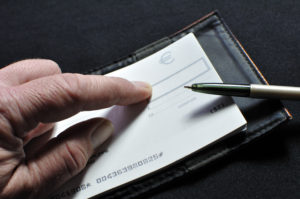
Things happen and sometimes situations get out of our control. Many people in America have found themselves in a difficult spot when their loved one is accused of a crime and has been arrested. When your loved one or relative is in a tight spot and finds themselves in jail, you’ll likely go to great lengths to get them out. Bail bonds exist to let people out of jail while they await their trial. It’s important to be informed about the process, however, before you sign on any dotted lines. One of the frequent questions is about co-signing a bail bond.
As we have covered in previous posts, the history of bail in the United States goes way back to the country’s early history. The eight amendment bail clause prohibits excessive bail amounts and the fundamental purpose of bail is to simply tie a defendant to his/her jurisdiction, so that they may be tried in a court of law. The idea is that since people in the United States are innocent until proven guilty, holding them in jail until their court date may cause damage to their way of life or families. The bond is a promise that they will remain in the area and will show up to court. The bond system has undergone several changes throughout the country’s history.
Co-signing means that a person signs a promissory note or an indemnity agreement that financially obligates them to pay the full amount of the bond if the person does not appear for their court date. Once the bond has been signed, your loved one will be released pending the resolution of their court case.
You may be required to put down some collateral. By co-signing the bail bond, you are agreeing to take on the responsibility of that bond. If the person does not appear in court when they are scheduled to appear, it might mean that you will be required to pay the amount. Because of this, in some cases, collateral may be required. This might involve tangible assets and property like cars, homes, cash, and more. This is simply a kind of guarantee to the court that if the bond forfeits, the debt will be paid.
You have the duty to ensure the accused appears in court. By taking on the responsibility of the bail bond, you are, in fact, taking on the greater responsibility of ensuring that the accused appears in court on their given date. If the defendant does not show up to their court hearings, you could be held liable for the entire bond amount. If the person meets their requirements and shows up to their hearings and court dates, you will only be required to pay a small amount of the bond—usually about 10%.
You do have some say about the terms of the agreement. As a co-signer, you are able to request some stipulations before signing. You can request, for example, that the defendant receives drug treatment or subject themselves to a mental health examination. You can ask that the bond be withdrawn if the defendant continues to partake in these illegal activities to which you have advised against. If these activities continue, as a co-signer, you have the ability to request the bond be canceled and the accused be returned to jail.
You can have the accused return to jail. Just as with the above, if the accused flees or tries to avert their court date, you can inform the court of the person’s whereabouts and have them returned to jail.
The moral of the story here is that co-signing a bail bond is no laughing matter. It is something that should be thoughtfully considered. This should be an agreement you are comfortable in doing and one where you are confident the person will fulfill their requirements. A lot of times, the emotional chaos of having someone you love in jail can cloud or disrupt this judgment. Taking on this responsibility is a big commitment.
Requirements to be a Co-signer
Not everyone can become a co-signer for an accused. There are certain requirements that must be met by law in order to be allowed to sign on behalf of a defendant. In order to co-sign, you will have to show proof of employment, financial capability, residency, and more. The particulars of these laws might vary slightly by state. Essentially some of the main things that will be taken into consideration before a person can sign a bail bond include:
- Employment history
- Criminal history
- Available collateral
Find Out More With Freedom Bail Bonds
If you have a loved one that has been put in jail, give us a call. We can walk you through your options or the process of co-signing a bail bond if that is what you are prepared to do. We are happy to answer your questions. Call Freedom Bail Bonds today.
